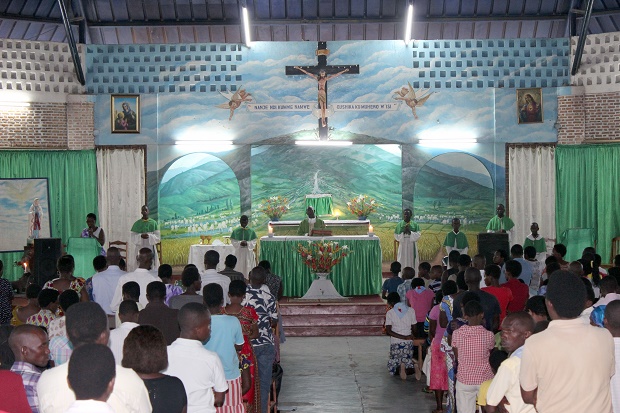
Burundians pray in a church in Bujumbura, Burundi, for peace in the country, Sunday, Nov. 8, 2015. Witnesses say seven people have been killed in an overnight attack at a bar in the violence-prone Burundi capital, Bujumbura. Witnesses on Sunday said they heard gunshots Saturday night at a bar in the Kanyosha neighborhood of Bujumbura, and later found bloodied bodies lying on the floor. AP
UNITED NATIONS — “Burundi is not in flames,” its foreign minister said Monday, dismissing international concerns that his country is at risk of a Rwanda-like genocide. But reports of killings by police continued, and France circulated a UN Security Council draft resolution threatening sanctions.
Foreign Minister Alain Aime Nyamitwe addressed the council as top UN officials and human rights groups urged action against what witnesses call a deadly government crackdown on opposition members.
Statements last week by officials echoing language used in the 1994 Rwanda genocide have raised alarms at the UN Like neighboring Rwanda, Burundi has a history of tensions between its Hutu and Tutsi ethnic groups.
“All possible influence must be brought to bear to halt what may be an imminent catastrophe,” said UN human rights chief Zeid Ra’ad Al Hussein. At least 240 people have been killed since protests began in April against President Pierre Nkurunziza’s ultimately successful quest for a third term, Zeid said, “with bodies dumped on the streets on an almost nightly basis.”
READ: 4 dead as Burundi killings continue; US says ‘alarmed’
A witness said one man was killed Monday in what Burundi’s government called an ongoing disarmament operation in the capital, Bujumbura. The witness, who resides in the Musaga neighborhood, said police fired at three young men who started to flee when they saw police entering the area. The witness spoke on condition of anonymity because of safety concerns.
Burundian security forces are conducting door-to-door searches in volatile neighborhoods seen as opposition strongholds.
Nkurunziza last week urged the police to use all means necessary to collect illegal weapons and gave civilians a week to turn in any unlicensed weapons in their possession. That deadline expired Sunday.
France’s draft Security Council resolution, obtained by The Associated Press, calls on Burundi’s government to immediately convene a national dialogue “to find a consensual and nationally owned solution to the current crisis.”
The draft also expresses the council’s intention “to consider additional measures, including targeted sanctions,” against any Burundian whose actions or speech contribute to the violence and impede peace efforts.
But before Monday’s meeting, Russia and China said they oppose the idea of imposing sanctions. Both countries hold veto power on the council, and their stance that the council should not interfere in the country’s affairs has blocked earlier council efforts on the crisis.
“We have to realize that sanctions are not the panacea for everything,” Chinese Ambassador Liu Jieyi told the AP.
READ: UN backs investigation of human rights violations in Burundi
When asked about Russia’s position that the crisis is a sovereign matter that Burundians must resolve themselves, the current council president, British Ambassador Matthew Rycroft, told reporters: “Well we hear that argument, but then we look at history and we remember what happened in that region, in neighboring Rwanda 21 years ago, and we must not let history repeat itself.”
More than 800,000 ethnic Tutsis and Hutu moderates were slaughtered in a campaign orchestrated by Rwanda’s extremist government of majority Hutus before it was overthrown by Tutsi-led rebels.
UN Secretary-General Ban Ki-moon on Monday appointed Jamal Benomar, the UN’s previous Yemen envoy, as a special adviser on Burundi and other matters.
The Security Council after its meeting expressed “shock” at the recent statements by Burundi’s government and urged immediate action toward a national dialogue to calm the crisis.